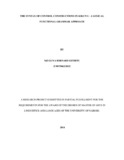The syntax of control constructions in Kikuyu: a lexical functional grammar approach
| dc.contributor.author | Njuguna, Bernard G | |
| dc.date.accessioned | 2014-12-04T11:50:17Z | |
| dc.date.available | 2014-12-04T11:50:17Z | |
| dc.date.issued | 2014 | |
| dc.identifier.citation | Degree Of Master Of Arts In Linguistics And Languages,2014 | en_US |
| dc.identifier.uri | http://hdl.handle.net/11295/76418 | |
| dc.description.abstract | This study endeavoured to test the claims of Lexical Functional Grammar (LFG)-which developed as an alternative to transformational theory-using control in Kikuyu. Government and Binding (GB) Theory formed the background. The aim was to identify the shortfalls of a GB account of Control and test the well-formedness conditions and principles in LFG. A further aim was to ascertain the extent to which anaphoric and functional control account for control in Kikuyu as well as the way LFG addresses the shortfalls of a GB account of control. Self-generated sentences and sentences from published and unpublished works in Kikuyu were listed and analyzed using GB theory before an LFG analysis. The study found that GB had several shortcomings in its account of Control which included government and portmanteau in the use of the subject agreement marker in Kikuyu. It was also found that the well-formedness conditions on F-structure (except coherence) and the principles working in C-structure license or constrain control in Kikuyu. Functional control was found to license raising constructions in Kikuyu while anaphoric control explains all the other forms of control in Kikuyu. However, there are forms of obligatory control in Kikuyu which the theory could not account for. The study therefore suggests further research to ascertain the adequacy of LFG in describing Bantu languages. | en_US |
| dc.language.iso | en | en_US |
| dc.publisher | University of Narobi | en_US |
| dc.title | The syntax of control constructions in Kikuyu: a lexical functional grammar approach | en_US |
| dc.type | Thesis | en_US |
| dc.type.material | en_US | en_US |

